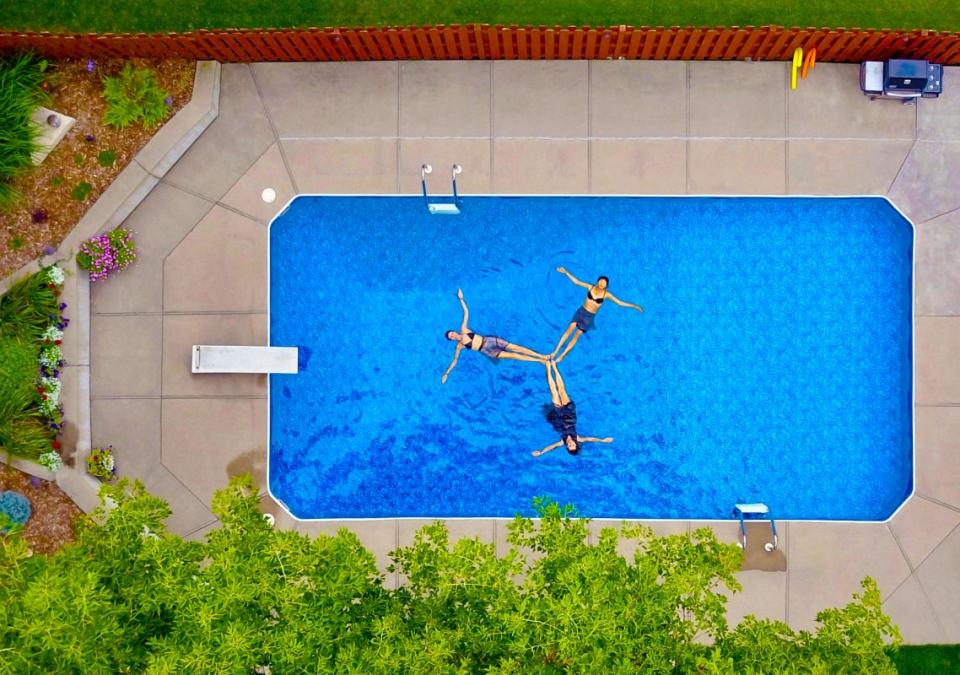Will Pool Chlorine Kill My Grass and Plants?
Many swimming pool owners worry about what effects chlorine may have on their lawn. Will it kill the grass? Will it harm the plants? From small chlorinated water splashes to deep saturations to the (*gulp*) bigger issues surrounding pool drainage, we're breaking it down with the help of Jimmie Meece, brand president of America’s Swimming Pool Company.
“Prolonged exposure to pure chlorine is detrimental to grass, but swimming pools use only a small, diluted amount," he tells us right from the get-go. "For example, an average pool’s chlorine levels range from 2-4 parts per million (ppm). Low chlorine levels are better for your swimmers as well as your grass, which is why the Centers for Disease Control recommends keeping your chlorinated pool water even lower, at about 1 ppm. The skin may start to get irritated by chlorine in the 10 ppm range and up, but even this level won’t damage your grass if it gets splashed." While it sounds like everyday splashes are a non-issue, it's good to know that a slightly heightened chlorine concentration isn't a problem, either.
What happens if I spill concentrated chlorine on my lawn?
A higher concentration of chlorine that accidentally spills onto grass seed, garden plants, or your beloved lawn is a different matter. Undiluted chlorine can cause significant damage to plant life, leading to burned grass, wilted plants, and potentially killing vegetation if not properly neutralized or diluted quickly. "If you happen to spill chlorine while you’re maintaining your pool, pour a bucket of water on it or hose it down," shares Meece. "You'll need to quickly dilute it before there’s damage to your pool deck or your landscaping."
Another important detail: Avoid foot traffic through the area until it's completely diluted, too. Pool chemical safety is extremely important as high concentrations of chlorine can have damaging effects not only on your healthy lawn, but your skin and body, too.

Photo by Eric Nopanen on Unsplash

Photo by Bruce Christianson on Unsplash
Does a saltwater pool use chlorine?
Yes—well, sort of. "If you have a saltwater pool, know that you still have levels of chlorine compounds – that’s what the concentration of salt content converts to in order to keep your pool water sanitized," clarifies Meece. "In fact, a salt water pool will have similar chlorine levels as a typical pool. The salt level in the pool should be low enough that you don’t have to worry about the effects of salt water on your grass or plants when small amounts of water get in the grass."
Related: Can You Keep Your Swimming Pool Open During a Mild Winter?
Will draining my pool kill the grass?
"While your grass won’t suffer from typical contact with your pool’s water, there is an increased risk of damage during overflow drainage when your yard is deluged with chlorinated water or saltwater," cautions Meece. "This draining process is part of proper pool maintenance, so you don’t want to skip it. We recommend directing your drainage hose to a designated spot in your yard. Pick a less visible area and keep it plant-free." Historically, we've had success running the water down our driveway to disperse widely rather than flooding the lawn with pool water. While a concentration of chemicals isn't a concern, letting it flow over the stones, asphalt, and along the driveway helps disperse the water to the edges for irrigation while also directing it towards a storm drain and ditch.
Related: This Bluetooth Enabled Pool Water Testing Device Delivers Fast, Reliable Results

